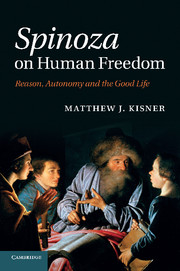Book contents
- Frontmatter
- Contents
- Abbreviations and translations
- Acknowledgments
- Introduction: Beyond therapy
- 1 Freedom as rationality
- 2 Justifying Spinoza's conception of freedom
- 3 Autonomy and responsibility
- 4 Freedom and happiness
- 5 The good
- 6 The natural law
- 7 Benevolence
- 8 The free man
- 9 Rational deliberation
- 10 The character of freedom
- 11 The freedom of the citizen
- Conclusion: “The true freedom of man”
- Bibliography
- Index
8 - The free man
Published online by Cambridge University Press: 01 March 2011
- Frontmatter
- Contents
- Abbreviations and translations
- Acknowledgments
- Introduction: Beyond therapy
- 1 Freedom as rationality
- 2 Justifying Spinoza's conception of freedom
- 3 Autonomy and responsibility
- 4 Freedom and happiness
- 5 The good
- 6 The natural law
- 7 Benevolence
- 8 The free man
- 9 Rational deliberation
- 10 The character of freedom
- 11 The freedom of the citizen
- Conclusion: “The true freedom of man”
- Bibliography
- Index
Summary
Having examined, in the previous three chapters, Spinoza's view on reason's practical guidance, we can now consider how this guidance translates into practice, or, to rephrase in the light of Spinoza's eudaimonism, what a life in accordance with reason's guidance looks like. In taking up this question, the traditional starting place has been Spinoza's account of the free man (4p66s–4p73). This way of thinking is justified on the grounds that the free man is the model of human nature from 4pref and, thus, the goal of a free life. This approach, paradoxically, has been as much of an end point as a starting point: since the free man, according to most of Spinoza's remarks, enjoys a life of perfect freedom, which humans cannot attain, this reading gives the impression that he has little assistance to offer in envisioning a good life for us, ordinary humans. While the remaining chapters will pursue more promising routes to understanding the good life, this chapter aims to show that it is a mistake to look to Spinoza's free man as providing significant guidance on the matter. This is because the free man is best understood as a thought experiment demonstrating reason's guidance and rational emotions, rather than providing a realistic example of human freedom. This is perhaps the most controversial aspect of my view, because it denies the nearly universally accepted reading, that the free man is the model of human nature.
- Type
- Chapter
- Information
- Spinoza on Human FreedomReason, Autonomy and the Good Life, pp. 162 - 178Publisher: Cambridge University PressPrint publication year: 2011



